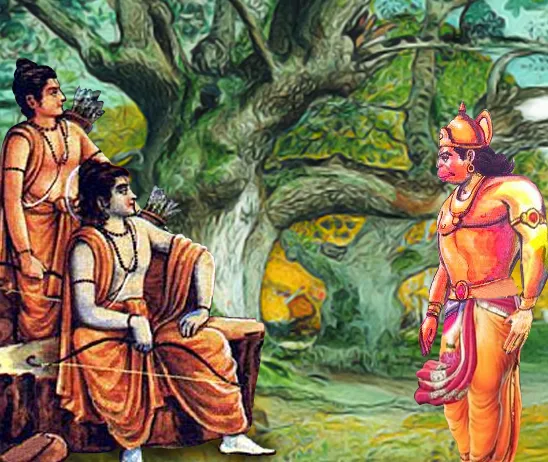
Our seers and saints of yore believed that it is the word that creates the world. So they attached greatest importance to ‘word-culture’—of using the most powerful instrument of speech for their own satisfaction and for others’ delight. Among them, Valmiki, an exemplary exponent of the calculus of speech shaped his favourite character Hanuman, in his Ramayana, as a splendid specimen of word-culture. For instance, look at this scene—
Hanuman, on his first meeting with Rama and Lakshmana on the outskirts of Kishkindha on the banks of Lake Pampa, presented himself thus: “Revered Sir, I bow to thee and to this younger gentleman whom I take to be your brother. You both are dressed like hermits, but armed like soldiers. Besides, in you is apparent a grace, which comes only of royal birth. May I know whether you are gods or ordinary men? I would also like to be enlightened on what brought you to these parts”.
Rama and Lakshmana remained silent, watching intently.
Hanuman continued—“Gentlemen, why are you quiet? You are, by the might of your figures, frightening the creatures of this region. But I can see from your gracious looks that you have not come here to hurt any of us. You also seem by the way you sigh in distress, to be on the lookout for something you miss. Kindly tell me the truth about yourselves”.
Yet Rama and Lakshmana remained silent. Hanuman felt it was no use vexing them with his questions, rather, he felt it desirable to tell them about himself. “Revered Sirs, please do not suspect me. Permit me to introduce myself to you. I am the son of Wind God. I am an adviser to the monkey king Sugriva. He lost both his kingdom and his wife to his greedy elder brother, Vali. I have come here at my Lord’s behest. He is prepared to be your friend if you have no objection. I for my part am very anxious to bring you and him together”. Then, Hanuman remained quiet with bowed head.
Impressed by Hanuman’s words, Rama said to Lakshmana —
“Nanrgvedavinitasya Nayajurvedadharinah,
Nasamavedvidusah Sakyamevam prabhasitum”
—“To speak in the way he has done is not possible for one who has not studied Rigveda with an eye to its meaning, not memorized Yajurveda and has no knowledge of Samaveda either.”
Brother, I am quite pleased with the art of speaking of this worthy messenger of Sugriva. From his very speech you can judge that he is a great scholar and a trustworthy minister”.
Rama praises Hanuman’s skill in speaking thus:
“Avistaram Asamdigdam
Avilambitam Aviyadham”
—(His speech emanating from his bosom and articulated by his throat is marked by) “absence of prolixity, is unambiguous, and unfaltering, and does not make a grating impression on one’s ears, uttered as it is in a modulated tone.”
“Look, how marvellously he spoke! He has not spoken a single syllable without significance, he has not wasted a single word, nor has he missed an appropriate word. He has not taken more time than his ideas needed. Every word that he spoke can never be forgotten. Such a voice promotes general good and remains forever in the minds and hearts of generations to come.”
Such is the language of the heart that Hanuman cultivated which Rama found praise-worthy. More than the content conveyed, it is the manner—“speaking a good deal with no fault in one’s face or in eyes, or in forehead or in eye brows, or in the limbs”— in which Hanuman presented that added dignity to the diction.
Nowhere else in the Ramayana, do we observe Rama praising anybody on his own. Does the saint poet Valmiki, by making no less than the Purushottam (the ideal man), Rama, speak highly about Hanuman’s communication expertise, expect us to realise the importance of communication? Indeed, the need for skilful communication is perhaps more evident in today’s world than in Valmiki’s time.
In today’s world, if one has to navigate through the maze of complexity, one should be able to “markedly influence the behaviours, thoughts, and/or feelings of a significant number of their fellow human beings” all “by word” alone. As Howard Gardner observed, it is only through powerful narrative that one can draw others alongside. Indeed, that’s what happens between Rama and Hanuman as the story advances.
GRK Murty
No comments:
Post a Comment